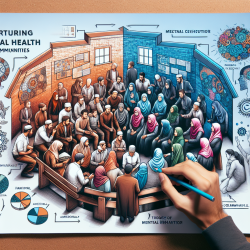Introduction
As the COVID-19 pandemic unfolded, faith communities faced unique challenges in balancing religious practices with public health guidelines. The research article, How can physicians advise faith communities during the COVID-19 pandemic?, provides valuable insights into how healthcare professionals can guide these communities. This blog post explores how practitioners, particularly those in online therapy services like TinyEYE, can apply these findings to improve outcomes for children and families within faith-based contexts.
Understanding the Research
The study conducted by Merry et al. (2020) emphasizes the role of physicians in advising faith communities during the pandemic. It highlights the need for clear communication, understanding of religious doctrines, and the integration of medical advice with spiritual guidance. The research underscores the importance of collaboration between healthcare providers and faith leaders to ensure safety while maintaining religious practices.
Implementing Research Findings in Online Therapy
For practitioners providing online therapy services, understanding the cultural and religious contexts of their clients is crucial. Here are some strategies derived from the research that can be applied to enhance therapy outcomes:
- Customized Communication: Tailor communication to address the specific concerns and beliefs of faith communities. Use clear, jargon-free language to explain health guidelines and their importance.
- Cultural Sensitivity: Recognize and respect the religious practices and beliefs of clients. This includes understanding the significance of religious gatherings and rituals.
- Collaboration with Faith Leaders: Engage with faith leaders to align therapy goals with religious teachings. This collaboration can help in gaining the trust of the community and ensuring adherence to health guidelines.
- Use of Technology: Leverage technology to provide virtual therapy sessions, ensuring that clients can continue to receive support while adhering to social distancing guidelines.
- Education and Empowerment: Educate clients and their families about the importance of following health guidelines and empower them to make informed decisions.
Encouraging Further Research
While the study provides a solid foundation, further research is needed to explore the long-term impact of integrating medical advice with religious practices. Practitioners are encouraged to contribute to this field by conducting studies that examine the effectiveness of different communication strategies and the role of technology in enhancing therapy outcomes for faith communities.
Conclusion
By implementing the findings from this research, practitioners can improve their skills and provide more effective support to faith communities. This approach not only enhances therapy outcomes but also fosters a sense of trust and collaboration between healthcare providers and religious groups. To read the original research paper, please follow this link: How can physicians advise faith communities during the COVID-19 pandemic?










